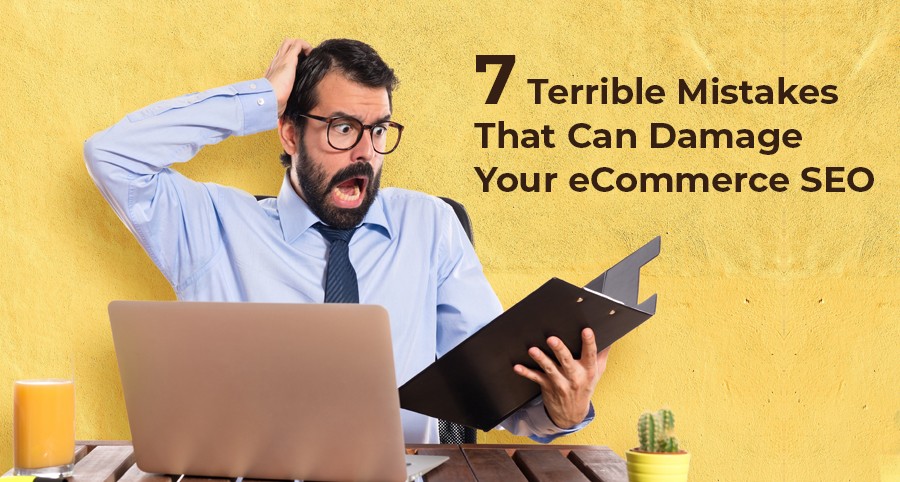
After auditing hundreds of websites, we, at Webplanners, realised that there are common SEO mistakes that the majority of website owners make (obviously unknowingly), that can drastically harm website and business as well.
It’s common for website owners to think that if they simply list hundreds or thousands of products on an eCommerce store, the traffic and search rankings will start to improve. But the hard reality is, it won’t. It will not get you any organic traffic or search ranking. And even if it happens, it may take years; hence you need to optimise as soon as you can.
So, here’s a list of critical SEO mistakes that you can avoid or manage.
Short or no Product description: One of the main issues we find with the eCommerce websites is; that there is no or significantly less product description. Text description of a product is vital, and no description means you are putting an end to the chances of the page to rank for a search query, even in the case of low-frequency queries.
So, be sure to add a text description to your products and increase their chances of ranking for related search queries.
Mistake#1. Duplicate content
Duplicate content is one thing, that’s not easy to identify or recognise. Knowingly or unknowingly, duplicate content can happen in multiple ways.
- It can be found on two or more different URLs.
- Same content on multiple pages.
- Using the product description from the manufacturer or copying it from the competitor’s product pages.
What should you do?
Always create your unique content. Whether it’s your product description, page content, about us information or any other piece of text on your website, if you have thousands of product pages and you can not write unique product description for each of them, consider putting a ‘NO INDEX’ meta tag on those pages.
Make sure,
- You do not create duplicate information within your website.
- You do not copy it from your competitors.
- Write unique content for each of your page.
- Use 301 redirects from duplicate pages to original pages.
- Use rel=canonical tags for essentially similar URLs.
Mistake#2. Poor content quality
Low-quality content leads to high bounce rate and lower rankings. Poor website content can’t keep your visitors for long, and consequently, they leave your site quickly, which contributes to ranking factors and website performance.
Consider creating exciting and valuable content that attracts visitors to your website. Look for their pain points and see how your products and services can help. Highlight benefits and write content that answers all the possible questions your customers/visitors may have.
Content like case studies, white papers, videos etc. are beneficial. You can also highlight testimonials or product reviews, media mentions, etc., to help boost trust.
Keep updating your blog page regularly and work with your content team to create a strong content strategy. Write for topics that interest your buyers and target audience. And then write well-researched blog posts.
Think from a user’s perspective and idealise what topics they can search for. It is crucial to base these subjects on long-tail keywords related to your product/service offerings. Make it enjoyable by adding images, infographics, reports, screenshots, etc., to back up your points.
Create shareable content which benefits in generating social signals. It helps your website to get crawled & indexed more frequently, which results in improved organic search visibility and traffic.
Long descriptive and comprehensive content facilitates your ability to rank on more keywords that are relevant to your niche. Every blog post is like making another sales call that generates brand awareness. It also helps in developing inbound links from other websites looking for relevant and informative content to link to.
Mistake #3. Keyword stuffing or keyword overuse
It is again a common issue we find with the majority of the eCommerce stores. Website owners think that using as many keywords as they can get them a better ranking. The truth is, using keywords un-naturally or just stuffing in your content can be damaging.
Search engines are becoming increasingly intelligent and complex; they can quickly identify and distinguish between high-quality content and keyword-stuffed content. And penalise websites that attempt to manipulate the system.
The best practice is to write as naturally as you can. You can cover your target keyword in the first paragraph, a couple in the body and one or two at the end of the content.
Mistake #4. Optimising for wrong keywords
SEO is all about keywords and search queries. If your eCommerce store is not optimised for correct keywords, you are going to fail miserably. Try to be as specific as you can. At times it is better to use specific keywords/phrases that lead to quicker rankings and more qualified traffic. It also increases your chances of converting those prospects into paying customers.
With time, think about optimising for more competitive keywords as your website grows and gains more authority. Following are some tips to help you find out more effective keywords that attract a relevant audience.
- Choose keywords that are relevant to your business, to your audience, are searchable and unique.
- The keywords you choose should neither be too general or too specific.
- Perform competitor analysis. Check what keywords they are using.
- You can use location-specific keywords.
- Know the intent of your keywords. Target the relevant keyword to achieve the right objective.
Mistake #5. Non-unique titles and meta description
We have seen many website owners using their company or website name as the title for every page throughout their website. It’s such a damaging mistake.
Each page on your site must have a unique title tag and meta description. It is not only important for SEO but when your website page is bookmarked or shared in tweets, your page titles are saved. For this reason, unique and descriptive titles are essential.
Similarly, meta descriptions are also crucial. These are the shortest (160 characters) sales pitch for your page in the search results.
Ensure to create a unique meta description, has your target keyword, is persuasive and should sound click-worthy.
Mistake #6. Failing to interlink webpages with target keyword
Another mistake that website owners make is the interlinking. They fail to use Anchor Text (hyperlink text) for internal links or using the same anchor text for every link. Linking a webpage with a “click here” or “check this post” or any other generic text won’t yield you anything.
As an SEO expert, we see it as a wasted opportunity. It can be easily replaced by a keyword or a relevant long-tail keyword. The text can be the title of the webpage you are linking to.
Mistake #7. Failing to optimise for local search
If you are a local business that depends on foot traffic more than the web traffic, you must optimise for local searches. Ranking for local traffic is easier than ranking for global traffic. To optimise for local, include region/area-specific keywords in your page titles, meta descriptions and in-text too (if possible).
Sign up for a Google My Business account and use it to leverage your local search. For more information on reading this article, Why Google My Business optimisation is crucial for every business?
Final thought
SEO is a scientific approach and is not difficult to master. Once you get a fair understanding and knowledge, you can easily avoid the common pitfalls and avoid making mistakes that can cost your website performance.

